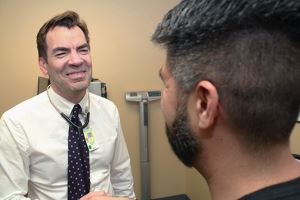Cancer Screenings Save Lives
- Category: Bay Healthier Together, Cancer
- Posted On:
- Written By: Steven Curran, MD

Saying that cancer screenings affect outcomes is an understatement.
Whether it’s a Pap smear or genetic testing, the goal of a screening is to find cancer before a person has any symptoms. This early detection allows doctors to isolate and treat abnormal cells before they get the chance to grow or spread. It doesn’t just reduce treatment time, it saves lives.
The earlier you detect cancer, the earlier you can treat cancer, the better your odds of beating cancer.
What types of screenings are available?
There are many types of cancer screenings available, but, unless you exhibit specific risk factors, you’ll probably never need most of them. That said, the most common types of screenings are for skin cancer, lung cancer, colon cancer, breast cancer, cervical cancer, and prostate cancer. Additionally, DNA tests are an emerging way of determining genetic predisposition for certain types of cancers. A DNA test can reveal things like the BRCA mutation, which has been linked to increased risk of breast, ovarian, colon, pancreatic, and prostate cancers.
Who needs to be screened?
Everyone should be screened but it’s particularly important if you have lifestyle-related risk factors (like smoking, excessive alcohol intake, or frequent and prolonged sun exposure), a history of cancer, close family members who have had cancer, or gene mutations that have been linked to increased cancer risk.
When should I get screened?
Starting in your 20s, cancer screenings become part of your regular checkups. Unless you exhibit specific genetic mutations, generally speaking, which screenings you require and how often you need to be screened depend on age, sex, and risk factors. The American Cancer Society has a ton of great information about cancer screenings as well as lifestyle adjustments you can make to reduce your risk of cancer, but here’s the general breakdown:
In your 20s…
Starting at age 21, women should have a Pap smear every three years to detect cervical cancer, unless you’ve had an abnormal Pap result in the past or have tested positive for HPV.
Men and women, particularly if they are fair-skinned, tan frequently, or have a history of multiple severe sunburns, should make skin cancer screenings part of their yearly physicals.
In your 30s…
Unless you exhibit certain genetic risk factors, women in their 30s should be screened for both cervical cancer and HPV every five years or receive a Pap test alone every three years.
More time on earth means more time absorbing the sun’s UV rays, both men and women in their 30s should receive regular skin cancer screenings.
In your 40s…
As women enter their 40s, they should maintain their regular Pap schedule (cervical cancer and HPV every five years or Pap smear only every three years). Women should also be screened for breast cancer via mammogram every year starting at age 40 and conduct self-exams monthly.
At 40, men who have had a close family member get prostate cancer before the age of 65 should talk to their doctor about regular testing. Otherwise, beginning at age 45, men who are at a higher than average risk (African-American men and those with a family history of prostate cancer) should start the screening conversation with their doctors.
Both men and women should receive regular skin cancer screenings and should begin screening for colon cancer at 45.
In your 50s…
Women should continue receiving yearly mammograms to screen for breast cancer.
If there’s a history of abnormal Paps and cervical pre-cancer, women should receive regular screenings for 20 years after diagnosis. Otherwise, maintain a regular Pap schedule (cervical cancer and HPV every five years, or Pap smear only every three years).
Starting at 50, all men should speak to their doctors about the benefits and risks of regular prostate screenings.
In addition to regular skin cancer screenings, both men and women who are former or active smokers should consider receiving a yearly low-dose CT scan to screen for lung cancer.
In your 60s…
By age 65, no cervical cancer screening is needed for women with a history of normal results.
Screening for breast cancers with a mammogram should be continued by all women.
For men over the age of 65, the decision to screen for prostate cancer should depend on their current health and quality of life expectations. Primary care providers will be able to answer questions about risks and benefits.
Both men and women should receive regular skin cancer and colon cancer screenings. Former or active smokers should consider yearly low-dose CT scans to screen for lung cancer.
How do I get screened?
Primary Care Providers (PCPs), including family medicine doctors like myself, are the front line in cancer detection. By looking at risk factors like age, sex, family history, lifestyle and overall health, we can help develop an individualized screening plan to help detect and monitor the forms of cancer you’re most at risk for. So talk to your doctor about what screenings are right for you and how often you need to be screened.
If you’d like to learn more about the benefits of preventive screenings, I invite you to attend one of Washington Hospital’s community outreach seminars. To find a class near you or to register for a class, click here.
